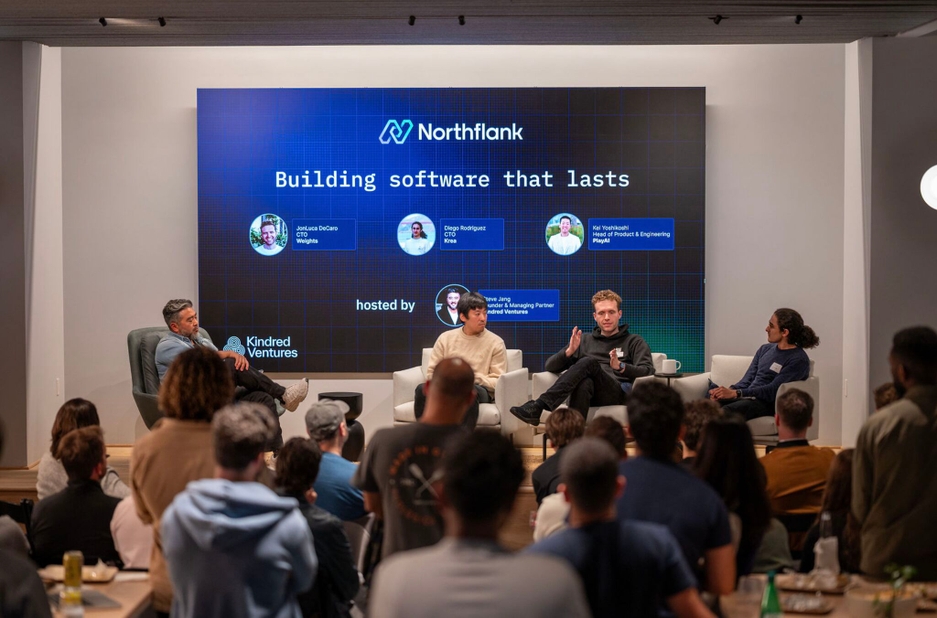

What we learned from hosting our first event in SF
Earlier this month we hosted our first in-person event in San Francisco. We teamed up with Kindred Ventures and brought together a group of engineers and founders to talk about what it means to build software that lasts.
It ended up being one of the most energizing nights we’ve had as a team.

At Northflank we’ve always been remote-first. Our team is forward deployed, globally, and most of our interactions with customers happen online. That works well for building and shipping quickly, but it also means we don’t get many chances to be in the same room as the people we’re building for. So when we do, we take it seriously.
We ran a panel with two of our customers (JonLuca DeCaro @ Weights and Kei Yoshikoshi @ PlayAI) and Diego Rodriguez from Krea AI.
All of them are building AI products, used by millions+ of people. The goal was to have an open conversation about the challenges of building infrastructure and applications that people depend on every day.
Steve Jang from Kindred moderated and kept the discussion sharp and focused.
A lot of the night focused on something we’ve been hearing more often from teams building in AI: users form attachments to the output of specific models, especially for audio, image, and video.
Kei talked about this in the context of PlayAI, where people don’t want their favorite voice models swapped out, even if newer models are technically better. You build something new, improve the performance, and then spend the next week answering messages from people asking why you took their favorite voice away.
Another point that came up is how fast feedback loops have become. Discord is now acting like a real(er)-time PagerDuty. You’ll hear from your community before your alerting system even fires. People care about small changes, and they notice them quickly.
Ideally people who’ve actually been through the hard stuff. We were lucky. All three speakers had clear, real-world experience and weren’t afraid to go deep.

Steve is a master at this. He asked great questions and let people talk without getting in the way.

Not pizza. We served mini beef wellingtons, beef sliders, fish tacos, chicken skewers, and lots more. Same goes for drinks.

If the environment’s right, they’ll talk for hours. You don’t need gimmicks, just people who care about the same problems.

It gave us enough time to fill the room with the right people without chasing RSVPs at the last minute. We had 200 people sign up and 100+ on the waitlist. Aim for 50-60% show-up rate.

Someone has to be responsible for the caterers, ice runs, mics, check-in, speaker timing, and anything that can go wrong. This matters more than it sounds like.

Especially the first time. People remember when something feels well-considered.
(Bonus lesson: engineers love a take-home gift bag. Popcorn for the road, and a Kool Aid, and even something practical like a branded tumbler can leave a lasting impression long after the event ends.)

One thing that surprised us was how social the night ended up being. Everyone stayed long after the panel finished. There’s something about being around people who are solving similar problems that naturally pulls conversation out of you. Most people we spoke to had come alone, but by the end of the night, they were deep in discussions about model architecture or deployment tooling or the best way to roll back changes in production.
For us, the biggest takeaway was this: if the theme of the night was “building software that lasts,” the same applies to how we build relationships, and how we show up in person.

We could have run a smaller event, or gone lighter on logistics, but our goal was to leave a lasting impression. Not by being flashy, but by being thoughtful, about who we invited, what we talked about, how the night felt.
That’s how we think about product too. At Northflank, we’re building a workload delivery platform that helps teams deploy and manage GPUs, services, jobs, and databases across production and staging environments. We support bring-your-own-cloud setups and Kubernetes-native infrastructure without requiring teams to write their own platform layer.
We try to take care of the messy parts of deployment so that teams can focus on shipping product.
Every piece of that, how logs work, how rollback is handled, how autoscaling is tuned, is something we’ve built with care. Because the people who use Northflank are doing serious work, and their expectations are high.
That’s what made this event so rewarding. It reminded us who we’re building for.
Thanks again to everyone who came, and to the speakers and the Kindred team for making it happen.
We’ll be doing more of these. And next time, we’ll probably order even more food.